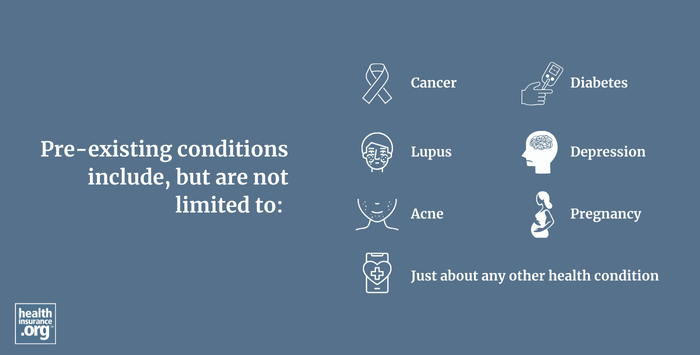
What is a pre-existing condition?
An illness or injury experienced before enrollment in a health insurance plan may be considered a pre-existing condition. Pre-existing conditions can include health issues such as cancer, diabetes, lupus, depression, acne, pregnancy, or just about any other health condition you can imagine.
Before 2014, health insurers in the individual market (ie, coverage that people buy themselves, as opposed to obtaining from an employer) used medical underwriting in nearly every state. That meant they could reject applications altogether, charge higher rates, or apply a waiting period if an applicant had a pre-existing condition.
And employer-sponsored health plans could impose waiting periods of up to 12 months before pre-existing conditions would be covered, if the person didn't have medical coverage just prior to joining the employer's plan.1 Today, as a result of the ACA, those practices are no longer allowed for individual or group health insurance. But some types of health coverage still use medical underwriting.
How are pre-existing conditions determined?
A pre-existing condition is a health issue that required diagnosis or treatment prior to an applicants' enrollment in a health plan. Before 2014, individual market insurers would set their own rules, but would generally have look-back periods of one to ten years, checking an applicant's applicable medical records to see if any health conditions had been diagnosed or treated during the window used by that insurer.
Can you be denied health insurance if you have a pre-existing condition?
Beginning in 2014, the Affordable Care Act (ACA) made it illegal for ACA-compliant major medical plans to deny applicants coverage due to a pre-existing condition.
This was already the case for employer-sponsored plans: Under HIPAA, which has been in effect since the mid-90s, employer-sponsored plans have long been prohibited from rejecting individual employees (or their dependents) based on medical history. But as noted above, HIPAA still allowed employer-sponsored plans to impose waiting periods before pre-existing conditions would be covered if the person didn't have prior continuous coverage.
And in many states, small group plans could adjust premiums based on the group's overall medical history. That practice was banned as of 2014 as well; small group plans can only adjust premiums based on age (for each covered family member), zip code, and tobacco use, just like individual market plans.2
So in most cases, insurers doing business today will not require applicants to fill out medical questionnaires or disqualify applicants due to a health issue. However, some health plans that aren't regulated by the ACA, such as short-term medical plans and fixed-indemnity plans, still require applicants to answer questions about health history when applying. If an applicant's answers indicate they have a pre-existing condition, they may be refused coverage under one of those plans.
Post-claims underwriting can also be used by these non-ACA-compliant plans, meaning that they'll accept most applicants with little in the way of upfront underwriting, but will then do a thorough check of the person's medical history if and when they have a medical claim. If the condition is determined to be pre-existing, coverage can be denied.
Do ACA-compliant health plans have to cover pre-existing conditions?
The ACA requires all non-grandfathered, non-grandmothered plans in the individual, small-group, and large-group market to cover pre-existing conditions the same as they would cover a new medical condition (ie, if the policy provides benefits for the condition in question, coverage cannot be denied due to the condition being pre-existing).
The law also eliminated waiting periods that used to apply to coverage for pre-existing conditions on employer-sponsored plans. (New employees can still have waiting periods of up to 90 days before they're eligible to enroll in the group's coverage, but this has nothing to do with pre-existing conditions.)3
As a result, ACA-regulated major medical plans always cover pre-existing conditions without waiting periods. Check with your insurance carrier or employer to see if your medical plan is ACA-compliant.
In the large group market, insurers can still use experience rating (ie, based on the group's overall medical history) to price coverage. But self-insurance is common in the large group market, meaning that large employers often just contract with an insurer to administer their coverage, while the employer's money is used to cover claims. And within a large group, pre-existing conditions cannot be used to adjust premiums or coverage for a specific member of the group.
Recommended reading: How to verify that your health plan is ACA-compliant.
Are health plans available that still exclude pre-existing conditions?
Short-term medical plans, Farm Bureau plans, and various other types of non-ACA-compliant health plans are allowed to deny you coverage or charge you higher premiums because you have pre-existing conditions. These plans can also exclude pre-existing conditions from coverage even if an applicant is approved for enrollment.
Grandmothered and grandfathered plans in the individual market can continue to exclude pre-existing conditions or impose higher premiums on people with pre-existing conditions, but these plans have not been sold to new applicants for several years (since March 2010 for grandfathered plans, and since late 2013 for grandmothered plans), so these are longstanding exclusions or rate adjustments that can continue to exist.
Medigap plans can also impost pre-existing condition waiting periods if you haven't had continuous coverage prior to enrolling.
Footnotes
- "Pre-Existing Condition Exclusion Period" Verywell Health. Jan. 21, 2024 ⤶
- "Market Rating Reforms" Centers for Medicare & Medicaid Services. Accessed Nov. 19, 2024 ⤶
- "Affordable Care Act Implementation FAQs - Set 16" Centers for Medicare & Medicaid Services. Accessed Nov. 19, 2024 ⤶


